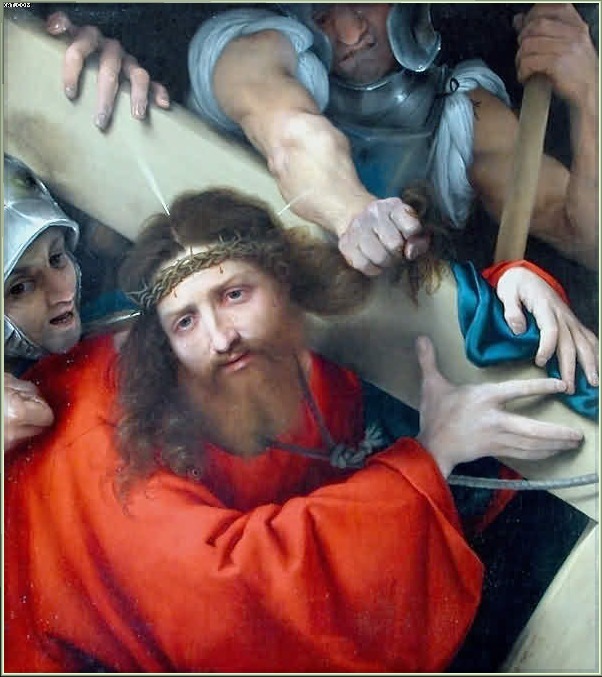
During His Passion our Lord was bound and dragged from place to place. I have hourly opportunities of imitating Him by going cheerfully to the duty of the moment: recreation when I want to be quiet, a walk when I would rather stay in my room, some unpleasant duty I did not expect, a call of charity which means great inconvenience for myself.
COMMENT: For many of us, Holy Week 2020 is one like no other. On Ash Wednesday I suggested that, as a result of the corona virus outbreak, we would have penances imposed on us that would not be of our own choosing. This has proven to be correct. To one extent or another, everyone reading this in Holy Week 2020 is impacted by the corona virus pandemic. It could be economic insecurity and loss of employment, fear and anxiety, illness, impending death or bereavement. For most lay people reading this it will mean the inability to access the sacraments, an especially painful experience this week above all others. Even the inability to go about our ordinary activities due to quarantines and lockdowns is a significant suffering for us.
God has foreseen all of this. Even if this is not all part of His active will, it is at least permitted by God. He is allowing us, this Holy Week, to be without the sacraments, without our freedoms, and facing serious social and economic upheavals. St Francis de Sales tells us that the cross that God has prepared for us is always the best one for us. It may not be the one chosen by us, but it is the one chosen by Him to bring forth the most fruit for our souls. Our path has to be to accept these current difficulties with a spirit of faith and serenity, knowing that it is in fact a time of tremendous grace, because whenever there is suffering, there is enough grace to embrace it and to profit from it. We have to strive to emerge from this crisis spiritually stronger than when it started. In particular, we have to exercise ourselves in a spirit of charity, especially for those in our households that we are “confined” with, but also for those in our communities who are in need.
Fr Doyle’s quote today may help us with this. Jesus was bound and had His freedom denied to Him. So too with us this year.
Fr Doyle’s insight shows us a straightforward way in which we can imitate Jesus in His passion. Pretty much all of us have some duties that attach to our state of life – as priests or as parents or as children or as employees. No matter how enthusiastic we may be about our life, there will be times when we find our duties onerous and would rather do something else. Being faithful to our duty, doing things we do not actually want to do, is a great (but difficult!) way of offering up some small penance and imitating Christ who was “bound and dragged from place to place”.
Fr Doyle exemplified this approach throughout his entire life, but one specific example comes to mind today. Here is how Alfred O’Rahilly describes it:
Fr Doyle was once saying goodbye to his brother at Cork railway station, promising himself a feast of the breviary and some hours of quiet prayer during the journey to Dublin, when to his horror he saw a lady acquaintance coming towards him. “Are you going to Dublin, Father?” Won’t you come into my carriage? My sister is with me and we can travel up together”. Fr Doyle murmured “Damn!” under his breath – which fortunately for our consolation was distinctly audible to his brother; but the next instant he was all smiles and amiability, he put his baggage into the indicated compartment, and talked and joked as if he was having the pleasantest experience of his life.
Perhaps some might consider this reaction of Fr Doyle to have been insincere. This is a mistaken interpretation. In this instance Fr Doyle shows us an excellent spirit of mortification and of charity. He could have made some excuse to get away from the woman; he could have sulked when he felt trapped by having to travel with her. But by embracing this particular inconvenience, by showing kindness to his unwanted travelling companion, he exercised great charity and self-control. In contrast, how many of us are guilty of hiding to avoid someone we find inconvenient or distasteful? Perhaps we could have helped them in their problems, but we preferred our own convenience…
As St Josemaria Escriva said:
That joke, that witty remark held on the tip of your tongue; the cheerful smile for those who annoy you; that silence when you’re unjustly accused; your friendly conversation with people whom you find boring and tactless; the daily effort to overlook one irritating detail or another in the persons who live with you… this, with perseverance, is indeed solid interior mortification.
And also:
Don’t say: ‘That person gets on my nerves.’ Think: ‘That person sanctifies me.’
In some cultures on Good Friday individuals have themselves nailed to a cross or walk through the streets flagellating themselves. Such public displays are not the normal path by which we are generally called.
By submitting ourselves to daily inconveniences, and by fulfilling the duty of the moment when we would rather do something else, we can imitate Jesus and acquire the virtue of patience. Best of all, by doing this we can be of help to others without drawing any attention to ourselves.
